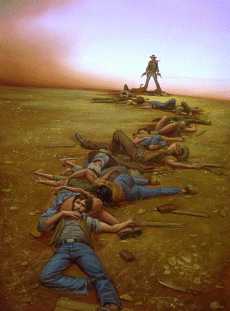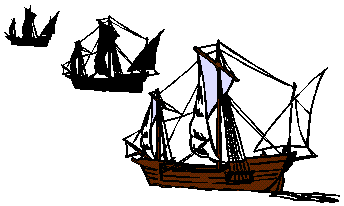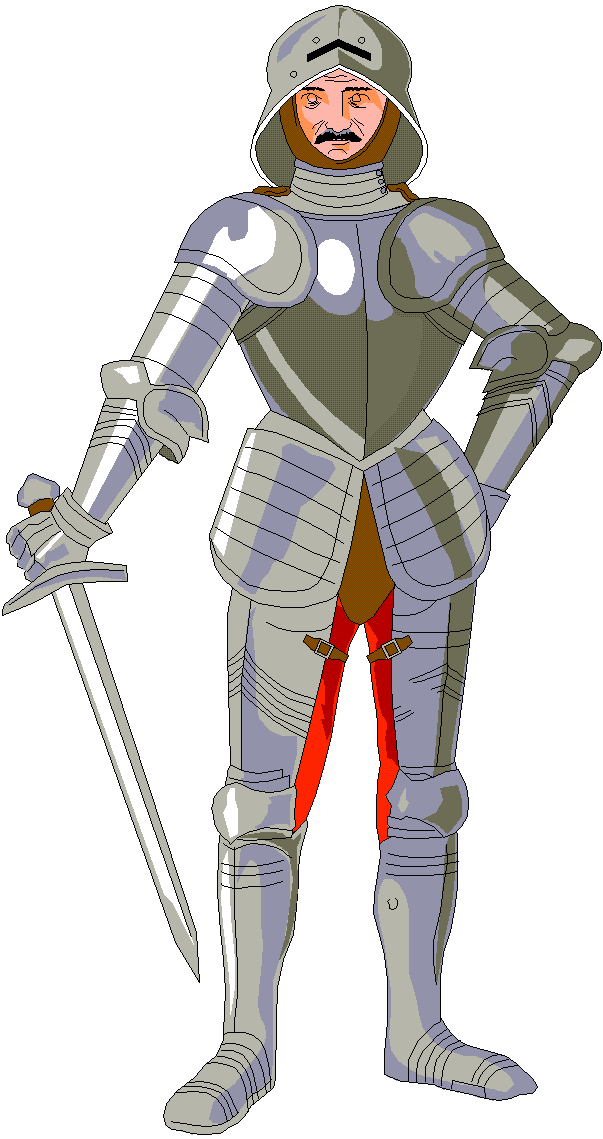 Another Stereotype of the Month entry:
Another Stereotype of the Month entry:
 Another Stereotype of the Month entry:
Another Stereotype of the Month entry:
From the Yale Daily News:
RIGHT SIDE UP | MEGHAN CLYNE
Published Wednesday, October 16, 2002
Columbus: no saint, but no Satan
Chalk it up to the town-gown divide. Every year in mid-October, it's fun to compare the scene at Yale to the one in the Wooster Street area. There, Columbus Day is celebrated to recognize the accomplishments of an intrepid Italian explorer. At Yale, however, Columbus Day is decried as the malicious promotion of a mass murderer.
Why the difference? Enter the protesters from the Association of Native Americans at Yale and other sympathetic organizations. Every year, members of these groups chalk campus buildings and sidewalks, make banners and flyers, and hold protests and discussions to educate the rest of the campus about the Great Satan: Christopher Columbus and the flood of white men that followed him. The argument: Columbus Day should be an occasion for mourning, not celebration — unless we're celebrating "Indigenous Peoples' Day."
The error that fuels this argument and these events is disturbing. Take, for example, this year's activities. Cross Campus was covered with anti-European slogans and red-splattered banners have been hung from Porter Gate advertising the "Native American Holocaust" that purportedly killed 100 million.
It just so happens, however, that comparing the European colonization and development of the Americas to the Holocaust lacks historical integrity and disrespects the victims of the Nazi genocide. Europeans did not invade and conquer the Americas with the intention of coldly and systematically destroying a whole people simply because of their race. They came seeking wealth, adventure and a safe haven from political persecution. Columbus did not come specifically with the intent of wiping out native Americans, because he wasn't looking for America in the first place. Columbus was seeking a route to the East and new trading partners — one obviously can't trade with dead men.
The fact is that native Americans were a valuable labor resource in the Spanish colonies, and their deaths were seen as a problematic loss, not a desirable end. What's more, even well-meaning Europeans like Bartolome de las Casas — protector of native Americans against dehumanizing practices like the encomienda and repartimiento — would have killed millions of natives, despite the nobility of their intentions. Why? The single greatest killer of the indigenous population was not violence or slavery, but disease — unintentionally brought by people looking not to kill, but to profit and to trade, and in some cases, to help. Columbus and other explorers, though they may have erred in other ways, cannot be blamed for inadvertently spreading germs. The logic of the Holocaust accusation just doesn't make sense.

Unless, of course, you think that the mere arrival of Europeans in the Americas was a heinous crime, another pet argument embraced by the anti-Columbus faction. It's hard to understand how colonizing, settling and civilizing are inherently wrong, and one only need look at the ultimate result of Columbus' accomplishment to understand why. His journey was the first domino in a long series leading to the Americas' inclusion in "the West," the fruits of which — democracy, liberty, human rights, the belief in a transcendent God, liberal education — we take for granted today. All of these come from the Western tradition, brought over throughout the centuries by adventurous Europeans. Columbus obviously didn't bring these ideas and institutions all by himself, but he lit the way for the people who did.
If anti-Columbus protesters are really so repulsed by these European institutions — if they really think the fact that we live in a free democratic republic instead of the Aztec empire, where the idea of "human rights" was human sacrifice, is such a bad idea — they open themselves to a few questions. First, why the chalkings and protests? The very exercise of free speech that allows them to graffiti on Yale property is the fruit of European thought, established by the descendants of white men who followed Columbus. Secondly, why are they even at Yale? The very liberal education that Yale provides is another of those evil Western inventions imposed upon natives; Yale was founded by men of European descent. Not a symbol of oppression, Yale is instead a wonderful example of a tradition of liberal learning that has led to some of mankind's greatest achievements. Anyone who thinks otherwise but still attends Yale either has to acknowledge the huge contradiction on his hands, or admit his hypocrisy.
It isn't difficult to see that Columbus Day is fraught with complexities. Is this discussion of history too simplistic to fully debate the issue? Yes. Is the space on this page enough for a sufficient discussion of the topic? No. It is, however, enough to point out that understanding Columbus Day requires balance and historical honesty. Columbus was certainly no saint, but he wasn't Christ either, and so should not have to take on the sins of every single settler who followed him. To say that we can't honor Columbus because Cortez was brutal is logically unsound, and wrong. Villifying Columbus to the point of denying any accomplishment is also erroneous. He may have transgressed, but he also achieved something extraordinary that took imagination and courage. To say we can't recognize the latter because of the former is like saying we can't recognize the greatness of the pyramids (either Egyptian or Mesoamerican) because they were built by slaves. If we only celebrated holidays honoring absolutely flawless men, we'd soon find ourselves with only two days off: Christmas and Easter.
If we appreciate Yale and America and the ideals upon which they were built, we have to acknowledge a debt to Columbus and the other European explorers and settlers who followed him. Anyone who doesn't is of course entitled to his bloodied flyers and chalk, but for those who do, I have a great suggestion. Spend next Columbus Day on Wooster Street instead of on campus — you'll get a more fair reaction to Christopher Columbus, and some delicious cannolis and pizza to boot.
Meghan Clyne is a senior in Branford College. Her column appears regularly on alternate Wednesdays.
Copyright © 2002 Yale Daily News Publishing Company, Inc. All rights reserved.

Rob's reply
It would be nice if someone wrote an original column defending Columbus on Columbus Day. Unfortunately, this column isn't it.
Some replies to Clyne:
>> Europeans did not invade and conquer the Americas with the intention of coldly and systematically destroying a whole people simply because of their race. <<
>> Columbus did not come specifically with the intent of wiping out native Americans, because he wasn't looking for America in the first place. <<
Right, because he didn't know Native Americans existed. Once he learned of their existence, then he started wiping them out.
>> The fact is that native Americans were a valuable labor resource in the Spanish colonies, and their deaths were seen as a problematic loss, not a desirable end. <<
If you work people to death, then become upset because of their loss of productivity, how does that make your actions moral? Fact is, whether the Spaniards killed Indians gleefully or "reluctantly," by wasting their lives in forced labor, they still killed them. Nothing in the definition of genocide requires extinction to be the primary motive for killing people.
>> Columbus and other explorers, though they may have erred in other ways, cannot be blamed for inadvertently spreading germs. <<
Yes, they can:
>> It's hard to understand how colonizing, settling and civilizing are inherently wrong, and one only need look at the ultimate result of Columbus' accomplishment to understand why. <<
Settling and civilizing a place is inherently wrong when it's already settled and civilized. To do so requires conquest and subjugation, concepts Clyne somehow fails to mention.
>> His journey was the first domino in a long series leading to the Americas' inclusion in "the West," the fruits of which — democracy, liberty, human rights, the belief in a transcendent God, liberal education — we take for granted today. All of these come from the Western tradition, brought over throughout the centuries by adventurous Europeans. <<
Multicultural origins of civilization
This ain't no party: a Columbus Day rant
Democracy rocks—with Indian help
Fun 4th of July facts

Europe gave us enlightenment?
Which "human rights" did the Europeans bring, exactly? Did women, blacks, and other minorities enjoy these rights also? Perhaps Clyne means the right to die, since Europeans certainly shared that "right" with the Indians.
No European country was close to being a democracy in 1492. Spain, the first country to colonize the Americas, was ruled by an absolute monarchy (the crown) and an absolute theocracy (the church). When the conquistadors and friars killed, conquered, or converted the Indians, what right did they bestow: the right to be ruled by lords and masters? Some "right."
Most of the Western "traditions" Clyne is thinking of took hold during the Enlightenment. That happened in the 18th century, or 200-plus year after Europeans began their cruel, amoral conquest of the Americas. Columbus doesn't deserve any more credit for Enlightenment thinking than the Indians he encountered. He was motivated by vanity, greed, and fanaticism, not a desire to "enlighten" anyone.
Clyne acknowledges this tacitly by calling Columbus the first in a series of dominos. But the question is whether Columbus himself did anything worthy, not whether those who followed him did. By Clyne's logic, one could say the Indians were the first domino, not Columbus. One could say they inspired the so-called Age of Exploration, not him.
For more on the subject, see Indians Gave Us Enlightenment.
So should we celebrate Columbus Day? Why not celebrate Indigenous Peoples' Day instead—as the protesters said? Indians are the ones who gave us concepts such as liberty, equality, and brotherhood, not Columbus.
Incidentally, who says "the belief in a transcendent God" is a "fruit"? Many have argued that this belief has caused more problems than it's solved—making it a rotten apple at best. Others have said it's merely "fruity," as in nuts.
And who says the Native American "creator" or "great spirit" isn't the same as the "transcendent God"? Or better? Sadly, Clyne's whole essay reeks of Eurocentrism.
So much for the benefits of a Yale education. No wonder George W. Bush is so convinced of his and America's moral superiority. He's much like Columbus: bumbling into situations that end up killing people. Getting credit for making mistakes.
Which continent was freer?
>> If anti-Columbus protesters are really so repulsed by these European institutions — if they really think the fact that we live in a free democratic republic instead of the Aztec empire, where the idea of "human rights" was human sacrifice <<
Were the Aztecs murdering "animals"?
Clyne makes a false analogy here, since the Aztec empire was short-lived and not representative of Native America. Meanwhile, contemporary Europeans were burning heretics at the stake, drowning "witches," and drawing and quartering criminals. One could call any of these a form of human sacrifice.
The proper choice isn't between the Aztec empire and a "free democratic republic" that came almost 300 years later. That's an apples-and-oranges comparison. The proper choice is between contemporaries: free Indian societies without kings or churches or despotic European societies with both. The people who came to America did so because they wanted to be more like Indians—to live freer, far from their tyrannical European masters.
>> Is the space on this page enough for a sufficient discussion of the topic? No. <<
Clearly not, judging by Clyne's effort. Luckily, space on the Web is almost unlimited.
>> It is, however, enough to point out that understanding Columbus Day requires balance and historical honesty. <<
The Native American view I've replicated here is balanced and historically honest. Clyne's view isn't.
>> He may have transgressed, but he also achieved something extraordinary that took imagination and courage. <<
I'm guessing the Indians whom Columbus executed or enslaved would say he definitely "transgressed."
"Imagination and courage"...are we talking about the same fellow who found America when he wasn't looking for it? This loser "imagined" himself in Asia, 10,000 or so miles from where he actually was.

Again, what did "Wrong-Way" Columbus accomplish, exactly? Native Americans had settled the continent tens of thousands of years previously. Many seafarers, from Polynesians to Vikings, had already visited it. All Christopher-come-lately did was bump into it accidentally.
The only reason we remember Columbus is because he publicized and exploited his find better than his predecessors did. So let's enshrine him in the Public Relations Hall of Fame (if it'll take him). That's about the only place he belongs.
Related links
Uncivilized Indians
Indians gave us enlightenment
Native vs. non-Native Americans: a summary
|
. . . |

|
All material © copyright its original owners, except where noted.
Original text and pictures © copyright 2007 by Robert Schmidt.
Copyrighted material is posted under the Fair Use provision of the Copyright Act,
which allows copying for nonprofit educational uses including criticism and commentary.
Comments sent to the publisher become the property of Blue Corn Comics
and may be used in other postings without permission.